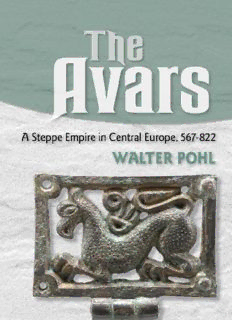
The Avars: A Steppe Empire in Central Europe, 567–822 PDF
Preview The Avars: A Steppe Empire in Central Europe, 567–822
THE AVARS THE AVARS A Steppe Empire in Central Europe, 567–822 Walter Pohl CORNELL UNIVERSITY PRESS ITHACA AND LONDON Original German-language edition, Die Awaren: Ein Steppenvolk im Mitteleuropa, 567–822 n. Chr . (3rd ed. 2015) by Walter Pohl, © Verlag C.H. Beck oHG, München 2015. Copyright © 2018 by Cornell University All rights reserved. Except for brief quotations in a review, this book, or parts thereof, must not be reproduced in any form without permission in writing from the publisher. For information, address Cornell University Press, Sage House, 512 East State Street, Ithaca, New York 14850. Visit our website at cornellpress.cornell.edu. First published 2018 by Cornell University Press Printed in the United States of America Library of Congress Cataloging-in-Publication Data Names: Pohl, Walter, 1953– author. Title: The Avars : a steppe empire in Europe, 567–822 / Walter Pohl. Other titles: Awaren. English Description: Ithaca [New York] : Cornell University Press, 2018. | Includes bibliographical references and index. Identifiers: LCCN 2018007698 (print) | LCCN 2018008080 (ebook) | ISBN 9781501729409 (pdf) | ISBN 9781501729416 (epub/mobi) | ISBN 9780801442100 | ISBN 9780801442100 (cloth ; alk. paper) Subjects: LCSH: Avars—Europe, Central. | Europe, Central—History. Classification: LCC DJK46.3 (ebook) | LCC DJK46.3.P6413 2018 (print) | DDC 943.0009/021—dc23 LC record available at https://lccn.loc.gov/2018007698 Cover illustration: Avar belt mount (eighth century). Metropolitan Museum of Art, New York. To my mother Edith Pohl 1921–2016 Contents List of Maps xi Timeline xiii Preface xxi 1. Approaching the Avars 1 1.1 Marginal Europeans? 1 1.2 Sources and Prejudices 5 1.3 Steppe Research and Its Methodological Problems 11 2. The Avar Migration 21 2.1 Constantinople 558 21 2.2 The Empire and the Steppe Peoples 26 2.3 Fugitives from the East 33 2.4 Avars or Pseudo-Avars? 38 2.5 The Advance of the Avars 47 2.6 Byzantium and the Turks 50 2.7 The Discovery of Europe 53 2.8 Decisive Years 58 2.9 568: A Turning Point 62 3. The New Power, 567–90 69 3.1 The First Attack on Sirmium 69 3.2 Between Peace and War 74 3.3 Baian’s Alliance with Byzantium 78 3.4 The Conquest of Sirmium 83 3.5 583/84: Avar Raids and Symbolic Politics 89 3.6 585/86: Slavic Raids and the Bookolabras Affair 94 3.7 587: The War in Thrace 96 3.8 The Carpathian Basin in the Later Sixth Century: The Archaeological Evidence 100 3.9 Cultures around Keszthely 109 4. Avars and Slavs 117 4.1 Slavs before the Avars: Perceptions and Origins 118 4.2 The Saint and the Barbarians 126 4.3 Slavic Campaigns and Memories of Avars on the Greek Peninsula 131 viii CONTENTS 4.4 The Obor and His Slavs 138 4.5 Avar Rule and Slavic Expansion 143 4.6 Becoming Slavs 150 5. The Balkan Wars of Maurice, 591–602 163 5.1 Maurice’s Campaign and the Date of the Wars 163 5.2 The Avars on the Offensive 168 5.3 593: Attacks on the Slavs North of the Danube 171 5.4 594: The Limits of the Slavic War 174 5.5 595: The Illyrian War 179 5.6 The Avars’ Western Policy and the Slavs 183 5.7 598: Only the Plague Can Stop the Avars 187 5.8 599: The Khagan under Pressure 191 5.9 600–602: The End of Imperial Politics on the Danube 194 6. Life and Organization in the Avar Empire 198 6.1 Nomads, Warriors, Steppe Peoples 198 6.2 “Their Life Is War” 209 6.3 The Early Avar Khaganate 215 6.4 The Avars and Byzantium 220 6.5 Avar Gold: Prestige, Gifts, Representation 230 6.6 Logades and Warriors 240 6.7 Forms of Production and Distribution 243 6.8 Exchanges and Their Limits 250 6.9 Religion and Ritual 254 6.10 The Development of Identities in the Avar Empire 262 7. The Seventh Century 280 7.1 Consolidation and New Offensives 280 7.2 The Surprise Attack on the Emperor 290 7.3 626: The Siege of Constantinople 294 7.4 Samo 305 7.5 Croat Migrations? 311 7.6 Alciocus and Kuvrat 318 7.7 Kuver and Asparukh 326 7.8 Continuity and Cultural Change 335 8. The Century of the Griffin 344 8.1 Ways of Life in Archaeological Evidence 344 8.2 The Hierarchy of the Late Avar State 352 8.3 Limes Certus : The Avars and the West 372 8.4 The Collapse of Avar Power 376 8.5 Why Did the Avars Disappear? 389 8.6 Conclusion 397 CONTENTS ix Appendix: Amount of Subsidies Paid by Byzantium to the Avars 403 Abbreviations 405 Notes 407 Sources 549 Bibliography 559 Index 621
Description: